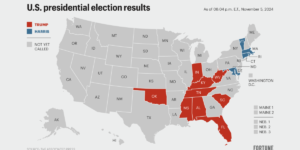Should You Ignore Chevron and Buy This Magnificent High-Yield Energy Stock Instead?
Chevron (NYSE: CVX) is a very well-run energy company. And it offers an attractive 4.3% dividend yield backed by 37 years worth of annual dividend increases. If you are looking for a diversified energy stock with a high yield, it would make a great addition to your portfolio. But if you care more about yield than about diversification, you might be better off with Enterprise Products Partners (NYSE: EPD). Here’s why.
Chevron is what is known as an integrated energy major. The “major” part is related to its size and industry position, noting that, given its $270 billion market cap, it is one of the largest energy companies on the planet. Its business is spread around the world, giving it a material amount of geographic diversification. But that isn’t the only diversification it has.
Start Your Mornings Smarter! Wake up with Breakfast news in your inbox every market day. Sign Up For Free »

The real lynchpin for being called integrated is that a company must have operations in energy production (the upstream), energy transportation (the midstream), and in chemicals and refining (the downstream). These are the three main segments of the broader energy sector and Chevron is a big player in every one of them. If you are looking for a simple way to add energy exposure to your portfolio while collecting a sizable and reliable dividend, Chevron is a great choice.
The one problem is that Chevron’s operation in the upstream and the downstream are highly volatile. That’s because both are driven by commodity products. So Chevron’s financial results can vary greatly from year to year and that can make it hard for more conservative investors to stick around over the long term.
That’s where a high-yield option like Enterprise Products Partners comes in. The yield is even larger at 7.2%. And this master limited partnership (MLP) operates in the most reliable segment of the energy patch, the midstream. It owns the transportation assets, like pipelines, that move oil and natural gas around the world.
The important piece here is that Enterprise charges fees for the use of the vital energy infrastructure it owns. The volume of energy products passing through its system is more important than the price of the products it is transporting. Energy demand tends to remain high even during oil downturns. And, thus, Enterprise’s cash flows are highly reliable. That’s how it has managed to increase its distribution every year for 26 consecutive years. Notably, the MLP’s distributable cash flow covers its distribution by 1.7 times, which means that there’s a lot of leeway for adversity before a cut would be on the table.
But why is the yield so high? The answer is pretty simple: That yield will likely make up the lion’s share of an investor’s return over time. The best growth opportunities are in the past. But if you add low-single-digit distribution growth (which is a reasonable expectation given the MLP’s distribution history) to a 7%+ distribution you get to the roughly 10% return most investors expect from the broader market over time. For conservative income investors who want a big yield from a reliable business, Enterprise could be an even better choice than Chevron.
Chevron is a very well-run energy company. It wouldn’t be a mistake to buy it if you are looking for broad exposure to the energy sector. However, if you are more interested in yield, then homing in on the midstream segment and buying Enterprise Products Partners, and its lofty 7.2% yield, might make a lot more sense for you. It is boring and the yield will make up most of your return over time, but if you are a dividend investor that probably won’t bother you at all.
Ever feel like you missed the boat in buying the most successful stocks? Then you’ll want to hear this.
On rare occasions, our expert team of analysts issues a “Double Down” stock recommendation for companies that they think are about to pop. If you’re worried you’ve already missed your chance to invest, now is the best time to buy before it’s too late. And the numbers speak for themselves:
-
Amazon: if you invested $1,000 when we doubled down in 2010, you’d have $22,292!*
-
Apple: if you invested $1,000 when we doubled down in 2008, you’d have $42,169!*
-
Netflix: if you invested $1,000 when we doubled down in 2004, you’d have $407,758!*
Right now, we’re issuing “Double Down” alerts for three incredible companies, and there may not be another chance like this anytime soon.
*Stock Advisor returns as of October 28, 2024
Reuben Gregg Brewer has no position in any of the stocks mentioned. The Motley Fool has positions in and recommends Chevron. The Motley Fool recommends Enterprise Products Partners. The Motley Fool has a disclosure policy.
Should You Ignore Chevron and Buy This Magnificent High-Yield Energy Stock Instead? was originally published by The Motley Fool








